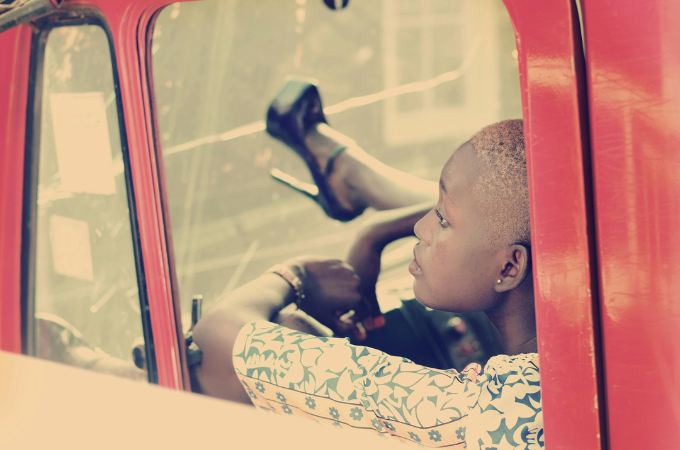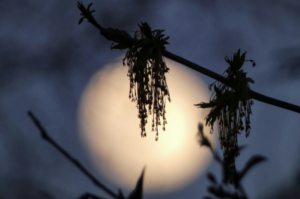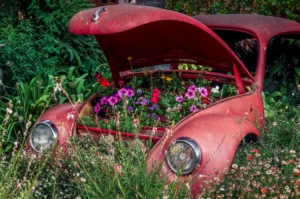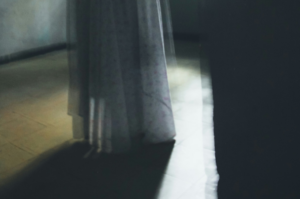
The girls down my street smear their lips in burgundy-red lipstick and smack it blithely in the rearview mirror of Alhaji Dan Kaka’s danfo bus. It is often telling by the way that Alhaji Dan Kaka yells – or viciously flings a bundle of raffia broom at them – that he does not want them near his Danfo, but they do not heed, instead, they trail their eyes insolently over his stooped body, snickering at the baldness of his head while making sharp “tawai tawai!” sounds with strawberry bubblegums. They call him a bloody hypocrite.
Each day they walk past our street in knife-pleated skirts flapping above their buttocks or strapless spaghetti gowns clinging to their thighs, my Umma shoves me inside and shuts the door tightly. She asks me to hold my ears and warns me not to be like the loud girls or Babban Yaro would leave me for Sarah. When I ask her why Babban Yaro laughs with the loud girls, she tells me that he is only using them, “They are not wife material, they cannot make Masa or Miyan Taushe. Babba Yaro only pretends to like them.”
“But why?”
“When it is time, you will know.”
In the mornings, they unceremoniously hail danfos and descend fire upon passengers who claim their spots on the bus, and at night, get drunk so as to play with the husbands of other people. Sarah twitches her face in disgust when they play with Babban Yaro, she spits and accuses them of Karuwa when they don’t look, saying they would never find husbands of their own. The loud girls do not go on their knees to greet the elderly men. It is said that girls like them do not pray to Allah when they begin their mornings. They push out their buttocks and sway their hips recklessly when they walk past, their laughter reverberating in a careless, ungrateful rhythm. Baba says it is the laughter of the loose and unguarded, the laughter of undignified girls. “Distasteful, completely distasteful attitude!” he chides further. “They let their voices out of the cup, now, see them, butts of the jokes in Zaria. Laughing stocks!”
When the loud girls steal the husbands of other people at night, as Amina says, I wonder if they steal Baba too, or if his face perpetually rumpled in disdain frightens them away. Whenever they steal Amina’s Baba, laughing and playing with him, Amina says they have visited their juju masters to charm him. She does not say this to their hearing, though – she is always wary of their presence. Everybody in the neighbourhood is wary of the loud girls, except the boys who drag their trousers halfway through their buttocks and inhale smoke from sizzling cigars, and the husbands they steal at night.
The mothers only let their daughters weave their hair at the loud girl’s shop because it is only the loud girls who maim stubborn twists and weave them into stylish, intricate hairstyles. Their shop stands at the last stop in Zogale Street – a small, hunched cubicle made out of Zinc and Plywood. Some mothers, though, prefer to make ugly hairstyles on their daughter’s hair, claiming that the loud girls carry diseases between their legs and would not let their daughters fix their heads in between them. By the roadside, at Iya Funmbi’s joint, the smoking boys wrap their arms across the loud girl’s shoulders and buy them fried yams and dankelis. The loud girls devour these yams and dankelis like thieves, but Amina says the poor boys are only chewing gum boyfriends – not real men like her Baba or Babban Yaro, just pawns in the loud girl’s dirty games. Amina says a lot.
She says the loud girls sell their bodies to Alhajis and kill the babies who sprout through their stomachs. She explains that one time, Dorcas – a girl who moved along with the loud girls – sprouted a small bump in her stomach but never breastfed a baby and the bump had flattened back to normal before the complete span. She says they buy the herbs from Malam Usman and massage his stomach when they run out of money. When she is sure that she is out of earshot, she whispers that the loud girls steal the husbands of other people with charms from their native doctors to replace the emptied-out shampoos and hair creams in their salon and that the wombs inside their stomachs are decomposing. She says the loud girls cannot carry babies anymore because their wombs are wounded from the occasions they tried to kill the other babies. When we ask how she knows, she says it is her Umma that tells her.
Sometimes I do not believe Amina. She is a gossip. I see the way her eyes glaze enviously at the burgundy lipsticks and Bob Marley wigs the loud girls fix on their heads. I know she dislikes the boring Suku hairstyle she is forced to carry by her Umma, weaved by a lazy Mama Ife. “They talk like men, walk like men, eat like men!” she argues defensively. “They don’t know they are killing themselves. My Umma said when they grow old, they will regret their lives. Allah ya kiyaye!” But all the Ummas hate the loud girls because they steal their husbands at night, although my Umma argues that they are a bad influence on the younger girls. She says if girls like Amina and I follow in their footsteps, we would have a generation of bad eggs, of unguarded girls, of uncouth girls who draw blood lipsticks and play with the husbands of other people. “Those girls are like that because their mothers failed at their responsibilities, but you, Habiba, you have a mother, a good mother,” Umma would caution.
She agrees with Baba that they are loud girls. She agrees with everything Baba says. She says that Baba is the mai Gida and that one day, Babban Yaro will be the Mai Gida of my new family. “You see, girls, they are built for nurturing, it is a special kind of joy having children with a man who leads and protects you. It is a wonderful feeling,” Umma cups my cheeks into her palms when she says this, and it allows me into the hollowness of her eyes – the way that it is dark and sunken, the sad flicker in it that suggests she is not in complete agreement. I see the way they linger unconsciously when the loud girls sashay through in their flattering spaghetti gowns. There is something in my Umma’s eyes that grows dark and glossy, something distant – like she is longing for something that is out of reach. But each time I probe she says it is only disdain. “You ask a lot of silly questions.”
She is fond of avoiding my questions unless they are ones about how being pregnant feels and how to know if your baby develops a fever. To the other questions, she gives “end of discussion” replies or sends me off to a chore. There are other questions, like why the boys who sag their trousers and cause the neighbourhood catarrh with the smokes from their cigars are not the butts of the jokes, as Baba says. I don’t ask Baba because his disgruntled face scares me, and he is always impatient to explain why I would be married to Babban Yaro.
When I ask Umma why she married Baba, she says it was the will of Allah, “He plans our lives for us, he knows us more than we do.”
“But what if you do not want what Allah plans for you?”
“Go and finish up your food, Habiba.”
I do not like Allah’s plan to marry Baba Yaro, but I do not tell my Umma – she will think that I am being held by Aljanu. I do not like his gigantic pot belly and garlic-reeking breath. A’ishatu is married to Babban Yaro but she squeezes her face like a mound of solid faeces being shot at with multiple arrows. I wonder often if my face would be squeezed like A’ishatu’s. I do not want it. I want a different life, astaghfirullah, but I seek the life of the loud girls. Sarah seems eager, though. She happily sends the Danwake her Umma prepares to Babban Yaro’s gida.
I want to ask Allah to look at me, but he seems so far away. I wonder if, like Baba said, he reads my mind. If he does, then Allah knows that I think of Hassan and wish that he looks at me, that I imagine myself as the loud girl, smacking my lips in a pool of burgundy red, lathering shampoo to stubborn twists, weaving intricate hairstyles, laughing away maniacally, chewing and making “tawai tawai!” sounds with bubble gums. He knows that I imagine myself pressing the change of customers into my breasts, parading the town in a dazzling bright red dress while beguiling Hassan and the husbands of other people.
If Allah also sees us in secret – as Baba also said – then he knows that Umma tries on spaghetti gowns behind shut doors – except that she forgets to shut the windows – and stands in our full-length mirror, watching herself. That after she is done, she hurriedly folds them and shoves them down her box of clothes where Baba would not find them. Allah would also know that Amina and Umar touch themselves in our backyard, behind Mama Ife’s fish pond. There is a lot that Allah would know.
I think of the loud girls and their irresponsible mothers. I think of the babies Amina said were killed with Mallam Usman’s herbs, their decomposed wombs – whether there are worms slithering in and out. I think of their inescapable flights and ungraceful laughter, of their unceremonious attitude at the bus stop, of their vicious hisses and resounding bubble gums, of their tight skirts and strapless gowns and their lipsticks and bob Marley wigs.
Baba says it serves them better to hide their faces in shame, but they are like open books, not minding that they are being scrutinised by everyone in the neighbourhood – they still laugh maniacally, still change the shades of their Bob Marley wigs every weekend, still smack their burgundy red lips in Alhaji Dan Kaka’s danfo and call him a hypocrite. They do not listen when Amina’s Umma cautions them about their future, admonishing them to close their legs or lower their voices when they laugh or sew longer skirts, rather they snicker and call her a tsohuwa, telling her to warn her daughter with a running mouth or they will deal with her one day. Amina avoids the path to their salon because she always has to dodge a slipper.
I think of Baba, too, of his ardent irritation towards the loud girls as though they are the pit of sewage behind our toilet, of Alhaji Dan Kaka and the nights he slithers into the loud girl’s block, taking his slippers in his palms, then the mornings he chases them away from his Danfo’s rearview with a bucket of frothy water, yelling “daughters of Jezebels!,” of Sarah, adjusting her hijab and smiling wildly at Babban Yaro, of Amina, the sounds that she and Umar make at our backyard.
I also think of Hassan, his long lashes and the whiteness of his teeth when he smiled. I still hope he looks at me even though it is impossible because he is always busy twisting his body under dusty, old cars with “wash me” written on their dirt at the mechanic park.
When I think of Umma and the spaghetti gowns pressed at the bottom of her box, or the darkness in her eyes when the loud girls walk by, I wonder if, as she says, she is truly happy with Baba. Maybe I will get her to answer my questions one day. Maybe I will finally tell her that I do not want to marry Babban Yaro even though it is Allah’s will.
I think of Allah, too, watching us from the heavens, holding our secrets, yet saying nothing.
Photo by Dazzle Jam from Pexels










COMMENTS -
Reader Interactions